When you have five children, you become accustomed to the spontaneous comments from strangers when they see your offspring spilling out of your minivan.
“What, you and your husband didn’t own a TV?” is one that got old rather quickly, but having been raised to be unfailingly polite, I always respond with a chuckle. Over the years, however, I’ve noticed that reactions have tended to become more positive, admiring, even wistful: “Wow, you are a champ!” and “Oh, I also wanted a large family, but we just couldn’t.”
This is my anecdotal experience, but it tracks nicely with the results of a recent Gallup poll which found that the percentage of Americans that think the ideal family should include three or more children is as high as it was in 1950. Today, almost half believe this, compared to a third in 2003.
Sadly, those desires for a large family are not matched with their fulfillment. The American birth rate is dangerously low at 1.6 births/woman, well beneath the replacement rate of 2.1 (the statistical number of children each woman would have to have in order to keep the population stable).
Much has been written about this widening mismatch, with thinkers and experts offering ideas on how to help Americans have more children, as they seem to want. There’s little question that larger families are a positive good for the country, as a demographically top-heavy society (with more old people, and fewer younger ones) presents all kinds of problems, beginning with economic ones (see: Japan).
Some researchers suggest that boosting the marriage rate or encouraging couples to get married earlier in life could help. Others point to inflation, housing shortages, and the stratospheric cost of higher education as root causes that could be curbed. The Brookings Institution calculated the cost of raising a child to adulthood today at $310,000, not including education. Gulp.
I’ll leave possible solutions for these existential problems to the experts. I’m more interested in why larger families have become aspirational, even as the material obstacles multiply.
I would like to think that, as modern and increasingly removed from all things “earthy” as we are, something about our ancestors’ conviction that sons and daughters are like flowers in a well-tended garden, or “arrows in a soldier’s quiver,” still rings true for us.
An older wisdom held that children were a net-positive: they were bearers of joy and excitement, prudent safeguards against the loneliness and dependency of old age, and fitting, happy workers in the family vineyard. The man with sons could pass on his wisdom and craft, as his father had to him. A woman with daughters had a web of female connection, a strong safety net stretched out under the precariousness of life.
“Thy wife shall be a fruitful vine, in the innermost parts of thy house; thy children like olive plants about thy table,“ the psalmist says. “Behold, thus shall the man be blessed that fears God” (Psalm 128.3).
We are, most of us, far away from vineyards and olive plants, but our lives are marked by the same desire for the blessings of connection. Something tells us that some are better than none, and so more must be even better. One child giggling and glad to see us when we come home harried after a long day is only topped by two children at the door and a cooing, messy-faced baby in a highchair.
And when those sons and daughters grow up, they become our special friends, the ones that will be there to care for us when our days of need inevitably arrive. The trappings of modern life may protect us from much, but they can’t protect us from the iron wheel of life, which sweeps us up and then inexorably down, down. Thank God for our children who are there to catch us.
A large family is an act of prudence in a hard and often joyless world. It’s also a great yes to the question of existence. It’s a vote of confidence in the essential goodness of God’s plan of salvation and a sign of our ready cooperation with his strategy. Christianity teaches that conceiving a child is an extraordinary act of co-creation with God himself and that we, the flawed vessels we are, participate in the crowning of his spectacular design.
If any of these thoughts and longings sound familiar, that’s a great sign. It means that we are just as human today as we were when the psalmists sang of the joy of generation. And that we are just as able to understand the principle behind the ancient belief: “Children are a gift from the Lord; they are a reward from him.”

